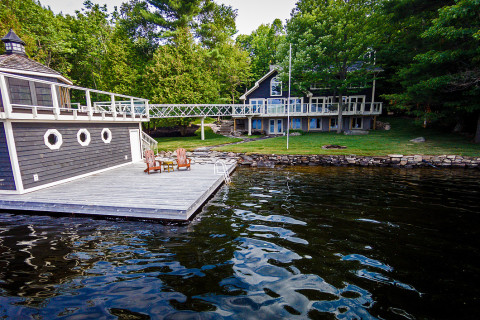At this time of year, pristine lakes, quiet trails, sandy shores and the peaceful pace of country living beckon. For many Canadians, a cottage or cabin outside of the city represents a long-term investment into a lifestyle that will be enjoyed for many seasons and generations to come.
Buying a house in the city or suburbs can be complicated, but buying a cottage or vacation property outside of town requires even more due diligence. By being properly prepared before buying, you will avoid unwelcome surprises after closing.
Before embarking on purchasing a second home/cottage be sure to make sure that it is a great location for real estate investment.
Here are some factors to consider when purchasing a cottage:
Needs & Wants
Write a list containing all of your wants and needs – current and future. For instance, do you prefer a private dock? Do you want a cottage with direct access to the beach? Do you need a place to dock your boat? Do you need road access? What is your budget? Which items are negotiable and which ones are non-negotiable? Detailing exactly what you need and want in your cottage will allow you to set clear expectations of what you are looking for and make it easier for your real estate agent to service your needs and help you find the cottage of your dreams.
Get Pre-Approved
Before beginning the search for your cottage, it can be a good idea to get pre-approved for a mortgage. This will help you set your budget and focus on price-appropriate properties and will also give you a competitive advantage over other buyers when making an offer in a tight market.
Is a second home still a safe investment without rental income padding the list of expenses? If it’s not, it may not be the right time to buy. A common mistake for many is purchasing a cottage with the expectation to rent it while unoccupied. Your budget should include a cottage’s fixed costs – avoid relying on rent to cover fixed costs.
Be sure to choose a property that’s manageable and leaves room for variable costs for extras such as a boat, dock, and maintenance – enjoy the full potential of the cottage lifestyle.
Talk to a Local Realtor
Working with a real estate agent who knows the area will help you to learn more about the neighbourhood and the properties available. Be sure to take your list of wants and needs with you to your initial consultation as this will allow your agent to show you the right cottages, in the right areas, that fit all of your requirements.
Learn the Geography
The perfect cottage in the wrong area will diminish the enjoyment you receive from your property, so it’s important to familiarize yourself with the area before you buy. Consider renting a cabin or cottage before purchasing to fully experience the area firsthand before making any decisions. This will allow you to get a feel for the types of people who stay there, the level of automobile and boat traffic, the weather and other important details that will determine whether the location is a good fit for you. You can change lots of things, but you can’t change location, so make sure the lot, and commute work for you.
Study the Social Scene
Take the time to get to know the cottagers who own in the area and ask them questions about their experiences. Are there lots of young families around? Is it more of a quiet, retiree crowd or is it more of a vacation spot for young adults? Are there upcoming developments or new access roads? Is this an area that you can see yourself enjoying for the next 10 years? Learning about the social scene will help you find a cottage community that best suits you.
Look into the History
Make sure you look into the history of the property and land before making any buying decisions. Land that is on or near a shoreline may shift and/or erode over time. Depending on the type of land the property is built on, the home may have settled or shifted (or may settle or shift in the future). In these cases, it may be better to buy a property that is further inland or to negotiate for a price that reflects the situation.
Get an Inspection & Lawyer
Cottages are usually occasional residences and so may not be as properly maintained as they should be. This is why every purchase should be conditional on a satisfactory professional home inspection.
Beyond maintenance of the cottage there are a number of things to think about outside. Even if you cottage fronts on water, this does not mean you own the land up to the lake. The first 66 feet fronting on onto the lake is typically owned by the local municipality and is referred to as the shore road allowance. This can present different problems. Consider Hydro easements – Check to see if there are any hydro poles or lines on the property. It is possible that Hydro has easements that are not registered on title that could affect where your cottage can be built. Access to your land is very important to understand if you do not have direct access from a municipal road. If it is a private right of way over a neighbour’s land, you must understand the terms of this agreement to ensure it is year round access and it is clear who is responsible for maintaining the road. If there is no registered right of way, there may be discrepancies on who owns the road between owners. In addition, check the local zoning by-laws to make sure the property is not zoned only for “seasonal” use. In these cases, the municipality may not be providing road maintenance, snow removal, garbage pickup or emergency services during the winter.
Be sure to cover all the bases and check, check, check.
Consult a Plumber
Many cottages require their own source of water, as they are typically located far away from city water mains. Find out whether the cottage uses water from a well, lake or other source and confirm the system in place. Consult a plumber to discuss the current state of the cottage’s plumbing system and any potential issues such as pipe insulation and sewage disposal. This will help you anticipate costs so that they are not surprises down the road. The replacement cost on a septic system can be up to $20,000 especially if there are stringent environmental regulations in your area.
Make sure of the following:
- A potability certificate from the local health authority, confirming the water is safe to drink;
- Confirmation that the well, the pump and related equipment have performed adequately during the seller’s occupancy;
- Confirmation that there is an adequate rate of flow for normal household use;
- Provision of a well driller’s certificate, if available;
- The location of the well;
- The system was installed with all necessary permits;
- The system has been adequately maintained and is working properly;
- The seller will provide copies of any inspection or approval reports;
- The seller agrees to pump out the tank at their expense prior to closing; and
- There are no work orders on file with the Ministry of the Environment or the local municipality.
Meet with a Contractor (if you Plan to Renovate)
If you’re planning on having renovations done, make sure you have a contractor look at the cottage and provide an opinion on the logistical and financial implications. When you receive your quote for the renovations, make sure that the price has been accounted for in your overall budget.
Choose the Right Time to Buy
Buying a cottage during vacation season means that you’ll be able to enjoy your property at its peak. However, you may also wish to buy in the off-season, when the demand for cottages is lower and there is a chance you may have more negotiation power. If you are looking for your dream cottage this summer, our experienced associates are here to help. Click here to search for cottages that might just fit your needs perfectly. Happy cottage hunting!
Do you have tips for purchasing a cottage? Share in the comments below.
Pssst… this dream cottage in Muskoka, Ontario is waiting for you:




